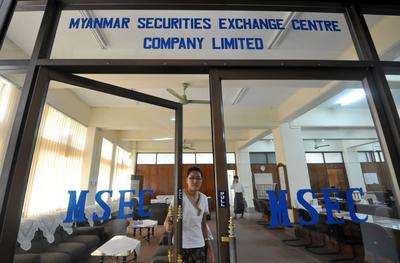Such sentiments are also widely shared among prospective foreign investors. Hotel rooms in Myanmar’s commercial capital, Yangon, are increasingly hard to come by, as are seats on the flights that bring a veritable flood of business people, anxious not to miss out on the rise of what they consider to be Asia’s next ‘tiger’.
Myanmar’s new-found place in the sun is the product of a series of reforms instigated by the country’s new president, Thein Sein, since he came to power at the head of a nominally civilian government in March 2011. Though most of these reforms have been political rather than economic, they have helped change international sentiment around on a country otherwise seen mostly as a human rights pariah, and with an economy long viewed as a wasteland of missed opportunities. Governments in Europe, the US, Canada, Australia and New Zealand have gradually lifted most of the sanctions they had imposed on Myanmar to reward the reforms, bolster the reformers and open up previously restricted business opportunities for their own nationals.
Despite this positive glow, Myanmar’s reforms are fragile and contingent upon a few key individuals, not least the President, Thein Sein and key lieutenants, but also opposition leader Aung San Suu Kyi. The reforms are also far from complete.
Not surprisingly, they are also pitched into a business environment that bears all the scars of five decades of misrule: degraded infrastructure, rampant corruption and cronyism, severe capacity constraints in government and policy making bodies, residual human rights abuses and ethnic conflict, a dysfunctional financial sector, and a myriad of other obstacles to a smooth transition. These impediments are common to reform scenarios in many places, but they suggest that the more bullish assessments of Myanmar’s economy should be viewed with caution.
Meanwhile, the remaining economic sanctions imposed on Myanmar continue to constrain investment flows that would otherwise be expected. The most crucial of these last sanctions is the import ban imposed by the US. This was first mandated in 2003 under the Burmese Freedom and Democracy Act of that year, and was authorised again on 18 July 2012 for three more years, which the US president can suspend if certain conditions are met. This sanction has the effect of making Myanmar an unlikely destination for foreign investment in labour-intensive manufactures such as clothing and textiles.
Domestic legislation with respect to foreign investment is a key and often decisive component of a country’s relative attractiveness as a destination for international capital. This is especially important for a transition country such as Myanmar, where policy has historically been unwelcoming and restrictive toward foreign investment.
Currently awaiting the signature of President Thein Sein is the new Foreign Investment Law designed to make the country more attractive for foreign investors. This new law will grant foreign investors the right to hold long leases on land (until now leaseholds have been greatly restricted and the state was the exclusive owner of most productive land). Overseas investors will also be able to enjoy a five-year profits tax ‘holiday’, other tax concessions, and are guaranteed against the nationalisation of their businesses (a necessary step given Myanmar’s long history of state expropriation).
So far, so good. But Myanmar’s new Foreign Investment Law is also reflective of the country’s continuing divisions. Specifically, the law has been heavily influenced by the interests of Myanmar’s ‘crony’ conglomerates, which in recent years have come to dominate key areas of the economy. With interests that extend to almost every sector, such cronies (as people in Myanmar routinely refer to them) are likely to feel the threat of foreign competition first and foremost. Accordingly, despite the liberal elements of the new Foreign Investment Law, other key clauses limit the role of foreign investors in a host of sectors, including retail trade, agricultural processing, fisheries and many light industries and services.
The outcome of this struggle between liberal reformers and the beneficiaries of Myanmar’s past regime will ultimately shape the new Foreign Investment Law. This struggle will also determine whether Myanmar is finally on the path to genuine transformational growth. A tiger in waiting perhaps, but not one yet.
Sean Turnell is Associate Professor in Economics at Macquarie University, Sydney.


A healthy dose of scepticism may not be amiss at the present time.
On a point of detail, my reading of the recent congressional legislation is that while Congress has given blanket approval for the continuance of the import ban if necessary for another three years, the actual ban has been extended only for another 12 months as Congress wishes to review the situation in 2013. In Senator Mitch McConnell’s words, the renewal of the BDFA for another three years “extends for another year the import ban with regard to Burma.”